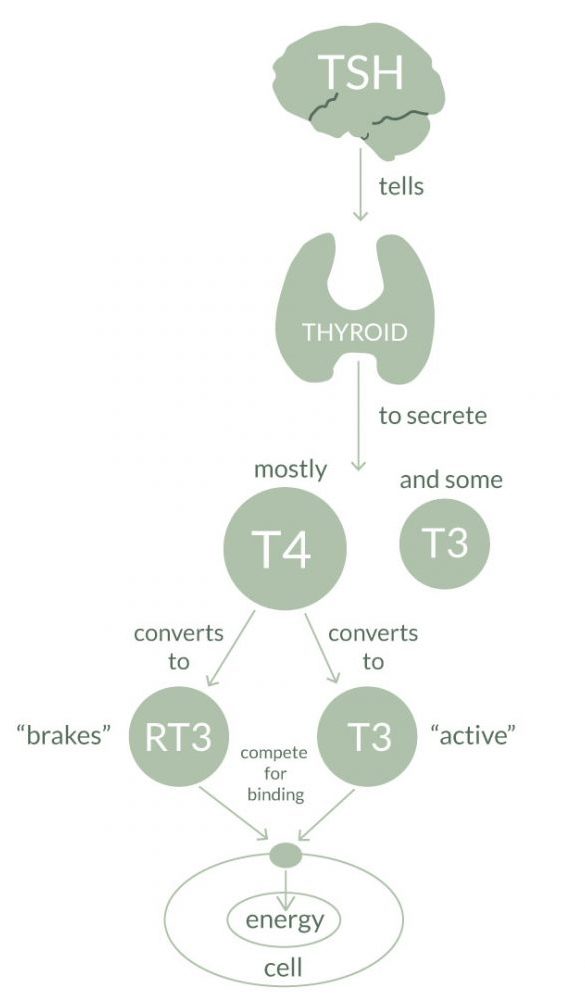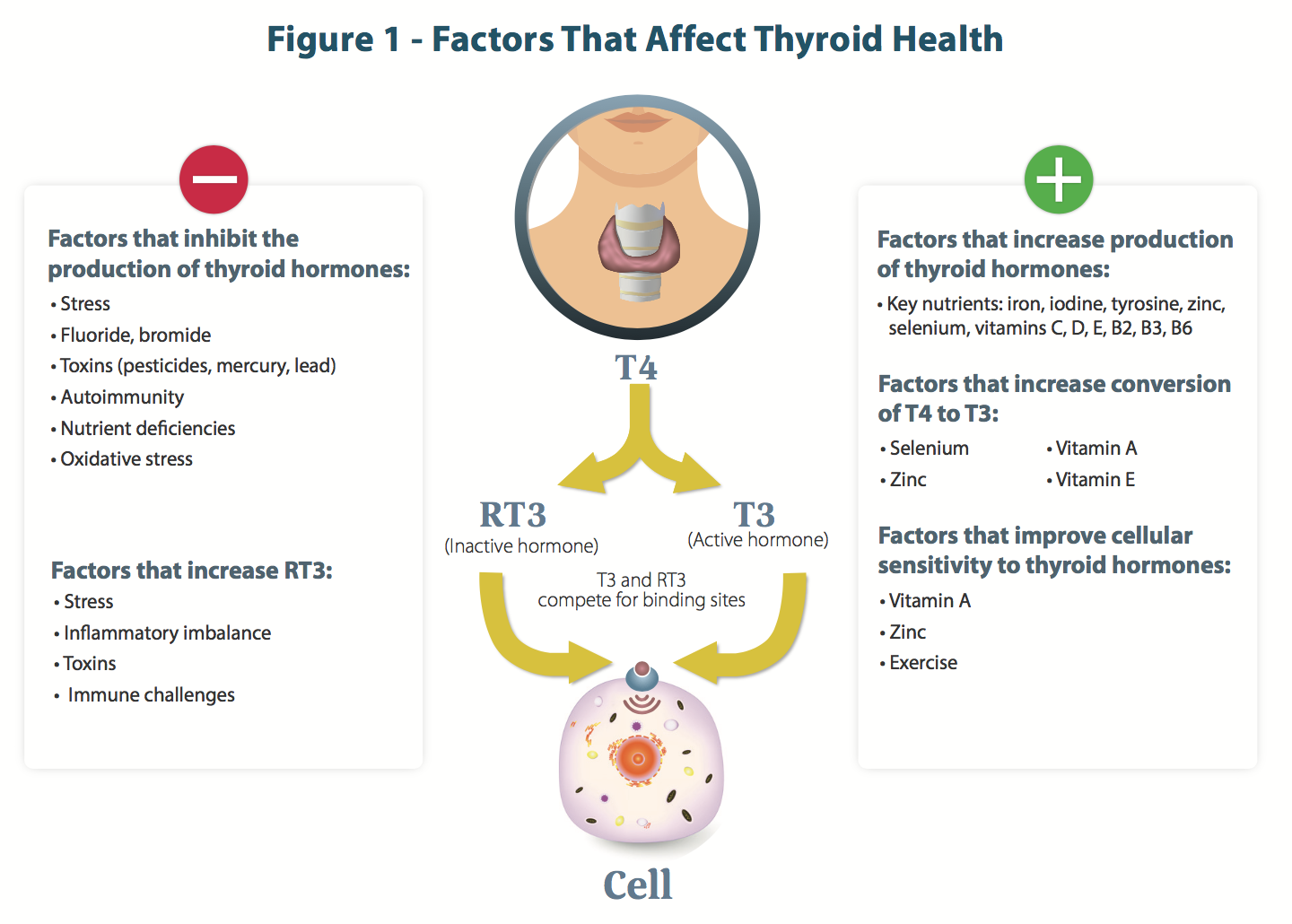Hypothyroidism
Published by NHC on
Hypothyroidism
Info | |
Description | A condition resulting in decreased production of thyroid hormones. Primary Hypothyroidism
Secondary Hypothyroidism
Subclinical Hypothyroidism
|
Signs & Symptoms |
|
Causes & Contributors |
|
Pathophysiology/Aetiology |
|
Physiology | 
|
Commonly Affected |
|
Complications |
|
Treatment | |
Best Therapeutic Treatment | Testing (for correct diagnosis)
*Once diagnosis of type of hypothyroidism has been determined, proceed with further investigations/treatment as necessary. Dietary
Consume These:
Avoid These:
Combination Product
Lifestyle
*Other treatments will vary depending on underlying cause |
Herbal |
|
Nutritional |
|
Dietary | Consume These:
Avoid These:
*Give food swap ideas if necessary |
Lifestyle | Exercise
|
Pharmaceutical | Levothyroxine
|
Combination Products |
|
More | |
Diagnostic Criteria |
|
Testing/Examinations |
*Thyroid hormone levels fluctuate throughout the day and false negatives can occur |
Images/Infographics |  |
Babiker, A., Alawi, A., Al Atawi, M., & Al Alwan, I. (2020). The role of micronutrients in thyroid dysfunction. Sudanese journal of paediatrics, 20(1), 13–19. https://doi.org/10.24911/SJP.106-1587138942
Bajaj, J. K., Salwan, P., & Salwan, S. (2016). Various Possible Toxicants Involved in Thyroid Dysfunction: A Review. Journal of clinical and diagnostic research : JCDR, 10(1), FE01–FE3. https://doi.org/10.7860/JCDR/2016/15195.7092
Bargiel, P., Szczuko, M., Stachowska, L., Prowans, P., Czapla, N., Markowska, M., Petriczko, J., Kledzik, J., Jędrzejczyk-Kledzik, A., Palma, J., Zabielska, P., & Maciejewska-Markiewicz, D. (2021). Microbiome Metabolites and Thyroid Dysfunction. Journal of clinical medicine, 10(16), 3609. https://doi.org/10.3390/jcm10163609
Bone, K. (2007). The Ultimate Herbal Compendium. Phytotherapy Press
Braun, L., & Cohen, M. (2015). Herbs and Natural Supplements, Volume 2. Elsevier Health Sciences.
Cayres, L., de Salis, L., Rodrigues, G., Lengert, A., Biondi, A., Sargentini, L., Brisotti, J. L., Gomes, E., & de Oliveira, G. (2021). Detection of Alterations in the Gut Microbiota and Intestinal Permeability in Patients With Hashimoto Thyroiditis. Frontiers in immunology, 12, 579140. https://doi.org/10.3389/fimmu.2021.579140
Chaker, L., Bianco, A. C., Jonklaas, J., & Peeters, R. P. (2017). Hypothyroidism. Lancet (London, England), 390(10101), 1550–1562. https://doi.org/10.1016/S0140-6736(17)30703-1
Chung H. R. (2014). Iodine and thyroid function. Annals of pediatric endocrinology & metabolism, 19(1), 8–12. https://doi.org/10.6065/apem.2014.19.1.8
Hechtman, L. (2018). Clinical Naturopathic Medicine. Elsevier Health Sciences.
Ihnatowicz, P., Drywień, M., Wątor, P., & Wojsiat, J. (2020). The importance of nutritional factors and dietary management of Hashimoto’s thyroiditis. Annals of agricultural and environmental medicine : AAEM, 27(2), 184–193. https://doi.org/10.26444/aaem/112331
Jonklaas, J., Bianco, A. C., Bauer, A. J., Burman, K. D., Cappola, A. R., Celi, F. S., Cooper, D. S., Kim, B. W., Peeters, R. P., Rosenthal, M. S., Sawka, A. M., & American Thyroid Association Task Force on Thyroid Hormone Replacement (2014). Guidelines for the treatment of hypothyroidism: prepared by the american thyroid association task force on thyroid hormone replacement. Thyroid : official journal of the American Thyroid Association, 24(12), 1670–1751. https://doi.org/10.1089/thy.2014.0028
Knezevic, J., Starchl, C., Tmava Berisha, A., & Amrein, K. (2020). Thyroid-Gut-Axis: How Does the Microbiota Influence Thyroid Function?. Nutrients, 12(6), 1769. https://doi.org/10.3390/nu12061769
Paray, B. A., Albeshr, M. F., Jan, A. T., & Rather, I. A. (2020). Leaky Gut and Autoimmunity: An Intricate Balance in Individuals Health and the Diseased State. International journal of molecular sciences, 21(24), 9770. https://doi.org/10.3390/ijms21249770
Starchl, C., Scherkl, M., & Amrein, K. (2021). Celiac Disease and the Thyroid: Highlighting the Roles of Vitamin D and Iron. Nutrients, 13(6), 1755. https://doi.org/10.3390/nu13061755
Wu, H. J., & Wu, E. (2012). The role of gut microbiota in immune homeostasis and autoimmunity. Gut microbes, 3(1), 4–14. https://doi.org/10.4161/gmic.19320
